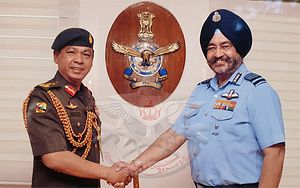Last week, Brunei’s military chief paid his introductory visit to India in his current position. The trip spotlighted the ongoing efforts by the two Asian states to continue to make inroads in their defense cooperation as they have been doing in recent years.
As I have noted before in these pages, India and Brunei have a defense relationship as part of their wider diplomatic relationship, which was established back in 1984. While interactions such as ship visits and exchanges had gone on for years prior, moves such as a defense memorandum of understanding concluded in 2016 further broadened the scope of cooperation and institutionalized it in various areas, including exchange of information and training, joint military exercises, dialogues, and defense industry cooperation.
Efforts to promote security collaboration continued on into 2019 as well. And last week, another manifestation of the defense aspect of the ties between the two countries was in the headlines again with the visit of Brunei’s military chief to India. Major General Pengiran Dato Paduka Seri Aminan bin Pengiran Haji Mahmud, commander of the Royal Brunei Armed Forces (RBAF), traveled to India in what was characterized as his first visit to the South Asian state in his current capacity.
The visit itself, which lasted from August 4 to August 8, consisted of a series of interactions. In terms of meetings, he along with his delegation met with a range of officials including the air force chief, Birender Singh Dhanoa, who is concurrently the chairman of the Chiefs of Staff Committee; the chief of the army staff, Bipin Rawat; and Karambir Singh, the chief of the naval staff. According to Brunei’s defense ministry (MINDEF), during the meetings, both sides discussed elements of the defense relationship between them and explored avenues to further strengthen military cooperation and interactions in the future.
Per MINDEF, the visit also included other interactions as well. This included a dinner hosted by Dhanoa at Akash Officers Mess as well as a visit to the Counterinsurgency and Jungle Warfare School (CIJWS) at Vairengte, a counterinsurgency training institution that focuses on a range of areas including training and research in unconventional warfare.
Unsurprisingly, few details were publicly disclosed about their private deliberations. Nonetheless, such interactions will be important to monitor to assess how both sides are actually operationalizing efforts to strengthen their defense collaboration in the coming months and years.

































